‘They aimed at the ocean, but got into medicine’: Tatarstan shipbuilders to use titanium for implants
Zelenodolsk Shipyard has mastered the technology of titanium powder production, on which manufacturers of implants on additive technologies (AT) depend
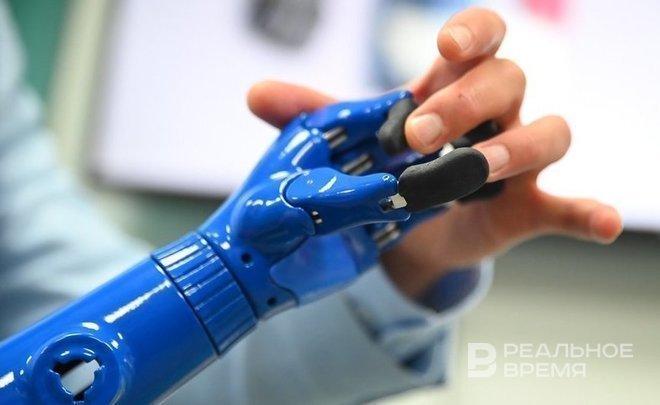
“A titanium endoprosthesis weighing only 200 grams will give a person the ability to walk, a dental implant — to chew, and replacing the “vertebra” will save his life," says the chief metallurgist of the Zelenodolsk Shipyard, Marat Saubanov. Four years ago, Tatarstan shipbuilders experimentally undertook the development of the production of titanium powder, necessary for the direct growth of implants using 3D printing. As it became known to Realnoe Vremya, the company has a lot of titanium powder for growing prostheses in 3D printing and developments in this area, but they are not ready to invest in the production of prostheses there yet — there are no firm orders and state support.
Preparing titanium powder and “pouring”
Zelenodolsk shipbuilders, who are building huge warships out of titanium and aluminum, did not stop at the dry execution of the State Defence Order and entered into cooperation with medical science and businesses. In partnership with Russian companies, the Zelenodolsk Shipyard produced prototypes of endoprostheses grown from titanium powder of own production. For the first time, their collection was shown at the recent exhibition of the V Additive Technologies — New Reality Leader Forum, organised by Rosatom in Kazan.
Next to each endoprosthesis, there was a flask with a titanium mixture — what each exhibit was made from. Few people noticed them, because titanium powders themselves are not a structural material, they are only a raw semi-product. But all players in the market of additive technologies depend on powder metallurgy. Apparently, for this reason, Ak Bars has taken up the development of its own method for producing titanium powder. Besides, titanium remains one of the most expensive materials, so not everyone will be able to buy it for scientific experiments and produce powders from it for 3D printing.
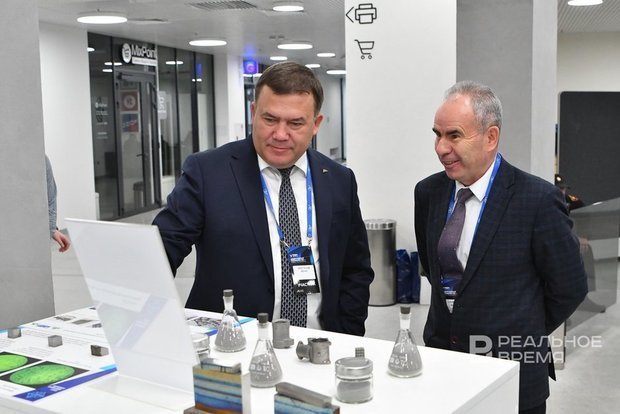
“We have been casting structural shaped castings from titanium alloys for more than 50 years. Neva-5, the most powerful titanium casting furnace in the country, operates at the plant. So our metallurgists had to study the properties of titanium alloys and technological subtleties in practice. But they have also found practical application in medicine," the chief metallurgist of the Zelenodolsk Shipyard, Marat Saubanov, told Realnoe Vremya.
According to him, the company's working group has developed its own technology for producing titanium powder from metal for several years. This is where the two-ton Neva-5 furnace was required, where titanium is sprayed under gas pressure. In the furnace, the metal is melted and then crushed into crystals, turning into powder. Then the titanium powders were tested on an industrial 3D printer. According to Marat Saubanov, the tests were conducted at the Prometheus Institute in Moscow, and then at the Kazan Federal University laboratory. In both, positive results were obtained. The technology of manufacturing titanium powders is patented in Rospatent. In a word, they aimed at the ocean, got into medicine.
“We are not changing the shipbuilding profile, but we are trying titanium in medicine”
Titanium is an invaluable material for medicine. Implants from it quickly get integrated in the human body and do not cause rejection. Neither copper, nor iron, nor any other material can organically “dissolve” in a human.
“We have different samples of implants," confirmed Oleg Varfolomeev, the technical director of Ak Bars shipbuilding company (a shareholder of the plant). “Of course, we did not grow them ourselves, but turned to our partners. Before purchasing an industrial 3D printer, it is necessary not only to study it, but also to have “useful” powders for it," he is sure.
As a result, the first endoprostheses were released on foreign printers. But the plant was convinced of the suitability of titanium powders and learned how to produce several types.
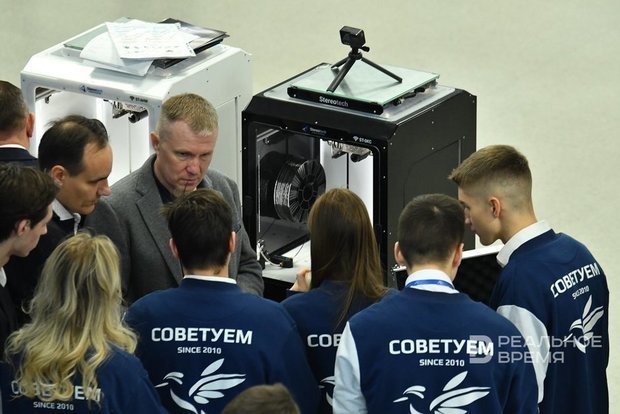
“We are not changing the shipbuilding profile, but now we are interested in titanium for medical devices," Varfolomeev assured. After all, with the withdrawal of foreign implant suppliers, the need for titanium powders in the medical industry will grow, he predicts.
Will Ak Bars go to Rosatom with an application?
Will Ak Bars submit an application to Rosatom with the creation of an additive technologies centre? “It would probably be premature to say that tomorrow we are going to create a centre for additive technologies," said the technical director of Ak Bars shipbuilding company. “Firstly, we do not know the needs of the market today. Although many say that this is a good, promising direction. But it is always necessary to consider what the economic exhaust from the invested investments will be," Varfolomeev argues.
Secondly, state support in bringing new medical products to the market should be greater, he believes. The upcoming subsidisation of R&D in the proportion of 50-50 has been recently announced by Director of Technological Development of the Rosatom State Corporation Andrey Shevchenko. According to him, the federal government is testing a project of a comprehensive scientific and technological programme that would compensate enterprises for R&D costs. The estimated cost is 20 billion rubles. The programme mechanism provides an interface between science and industry.
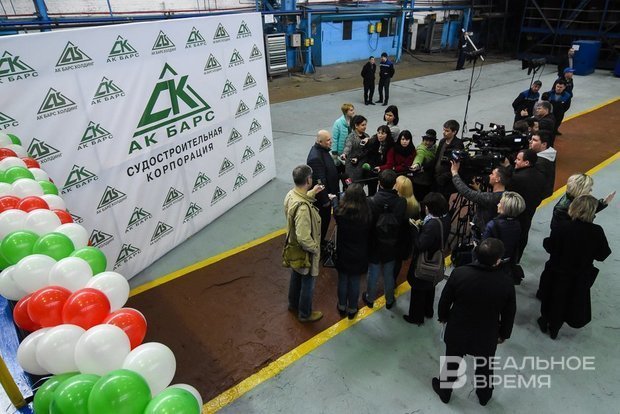
“In general, the programme is designed to bring products to the market. Here, 50% of the costs are paid by the state in the form of R&D, and the remaining 50% is private investment in the product itself," he said in a conversation with Realnoe Vremya.
This proportion will not quite suit manufacturers working under 44-FZ (under state order). Why? “If, according to the old Federal Target Programme, we 'entered' facilities for modernisation and technical re-equipment in the ratio of 60 to 40, now it is 90 to 10.”
“A subsidy of 50% for an enterprise operating under 44-FZ is probably a good injection. But it would be better if we made a ratio of 80 to 20 or 90 to 10. Well, judge for yourself, it is not necessary to be a great financier or businessman. Starting development by investing 50% of expenses and not having contracts for implementation means to “freeze” money," says the technical director of Ak Bars shipbuilding company.
On the other hand, we are well aware that the country is in the regime of special military operation. If there had been a different situation, the conditions would have been more favourable.
How to “legalise” grown components
Thirdly, regulatory regulations that prohibit changing the release technology independently remain a serious barrier to the introduction of AT. The main problem is that it is necessary to legalise in mechanical engineering and shipbuilding products that are grown using additive technologies. Components from AT will not pass the certification of the river register, and even more so military acceptance. Tests, inspections, approvals — all this will take a lot of time. You will have to go a long way to enter the configuration programme of a particular machine-building product. Those companies that have purchased 3D printers are still going through the certification of products.
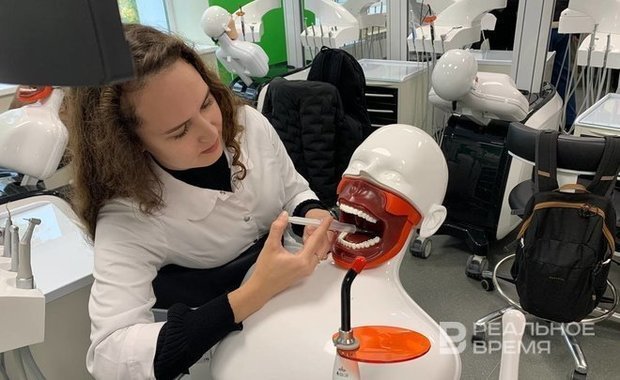
“We are familiar with this problem firsthand," admits the technical director of Ak Bars shipbuilding company. “When the first LNG carrier was built, we had to go through licensing procedures in a short time. Not all regulations stipulated that an LNG-fueled river vessel could sail on Russian rivers. Now they go only because we have joined in and made a lot of changes to the regulatory documents that river vessels on a new type of fuel can be operated by water in Russia, not only by highways. We had to go a long way to make changes to the requirements of the river register," says Varfolomeev.
“If there are no orders, then we will 'freeze' the money in 3D printing”
So far, Ak Bars is pricing additive technologies. “We have a potential partner, a potential customer, but there are no orders. Marketers are pausing. Everyone says that this is right and promising, but there is no complete certainty yet. When we have a package of orders, then we can talk about any products. Then we will take this issue to the board of directors. Investing without having a package of contracts is no longer a business. But work for the sake of work," the interlocutor of the publication doubts.
In the summer of this year, Rusatom Implant, a subsidiary of the TVEL integrator in the Metallurgy direction Rusatom Metalltech, announced its readiness to produce 140 thousand titanium implants (plates for bone osteosynthesis, pins for the treatment of fractures, etc.), as well as surgical instruments. By the end of 2024, Rosatom plans to occupy at least 30% of the Russian market of titanium implants.
Let us remind that Rosatom proposed to create centers of additive technologies on the basis of the Ural Works of Civil Aviation (UWSA), and in education — on the basis of KNRTU-KAI. However, while this option is not final, Andrei Shevchenko told Realnoe Vremya. According to him, the roadmap for the formation of the Central Data Centre was discussed with the rais of Tatarstan and will be formed during this year. The main point in it is the formation of demand for AT and a package of orders.
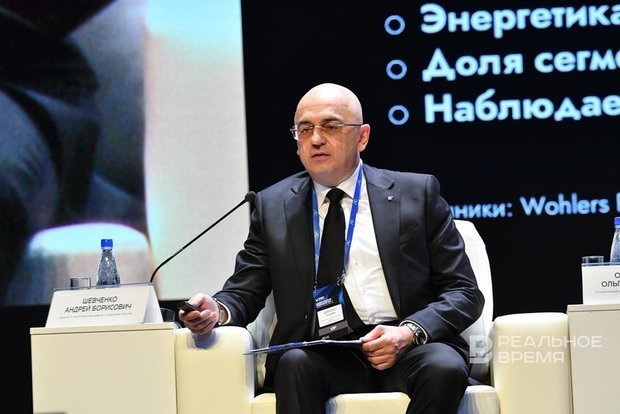
“We need to gather the heads of enterprises and form an order on their basis. There is no doubt what we will do. It is not the first year we have been working with the republic. Everything has been built, it is always executed on time. I think we will prepare a map with a perspective for 5-7 years. There is no doubt that it will be achieved," he concluded.